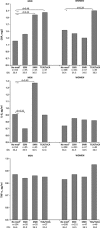Association of depressive disorders, depression characteristics and antidepressant medication with inflammation
- PMID: 22832816
- PMCID: PMC3309556
- DOI: 10.1038/tp.2012.8
Association of depressive disorders, depression characteristics and antidepressant medication with inflammation
Abstract
Growing evidence suggests that immune dysregulation may be involved in depressive disorders, but the exact nature of this association is still unknown and may be restricted to specific subgroups. This study examines the association between depressive disorders, depression characteristics and antidepressant medication with inflammation in a large cohort of controls and depressed persons, taking possible sex differences and important confounding factors into account. Persons (18-65 years) with a current (N = 1132) or remitted (N = 789) depressive disorder according to DSM-IV criteria and healthy controls (N = 494) were selected from the Netherlands Study of Depression and Anxiety. Assessments included clinical characteristics (severity, duration and age of onset), use of antidepressant medication and inflammatory markers (C-reactive protein (CRP), interleukin-6 (IL-6), tumor necrosis factor-alpha (TNF-α)). After adjustment for sociodemographics, currently depressed men, but not women, had higher levels of CRP (1.33 versus 0.92 mg l(-1), P<0.001, Cohen's d = 0.32) and IL-6 (0.88 versus 0.72 pg ml(-1), P = 0.01, Cohen's d = 0.23) than non-depressed peers. Associations reduced after considering lifestyle and disease indicators--especially body mass index--but remained significant for CRP. After full adjustment, highest inflammation levels were found in depressed men with an older age of depression onset (CRP, TNF-α). Furthermore, inflammation was increased in men using serotonin-norepinephrine reuptake inhibitors (CRP, IL-6) and in men and women using tri- or tetracyclic antidepressants (CRP), but decreased among men using selective serotonin reuptake inhibitors (IL-6). In conclusion, elevated inflammation was confirmed in depressed men, especially those with a late-onset depression. Specific antidepressants may differ in their effects on inflammation.
Figures

References
-
- Pigott HE, Leventhal AM, Alter GS, Boren JJ. Efficacy and effectiveness of antidepressants: current status of research. Psychother Psychosom. 2010;79:267–279. - PubMed
-
- Rush AJ, Trivedi MH, Wisniewski SR, Nierenberg AA, Stewart JW, Warden D, et al. Acute and longer-term outcomes in depressed outpatients requiring one or several treatment steps: a STAR*D report. Am J Psychiatry. 2006;163:1905–1917. - PubMed
-
- Dowlati Y, Herrmann N, Swardfager W, Liu H, Sham L, Reim EK, et al. A meta-analysis of cytokines in major depression. Biol Psychiatry. 2010;67:446–457. - PubMed
-
- Howren MB, Lamkin DM, Suls J. Associations of depression with C-reactive protein, IL-1, and IL-6: a meta-analysis. Psychosom Med. 2009;71:171–186. - PubMed
-
- Danner M, Kasl SV, Abramson JL, Vaccarino V. Association between depression and elevated C-reactive protein. Psychosom Med. 2003;65:347–356. - PubMed
Publication types
MeSH terms
Substances
LinkOut - more resources
Full Text Sources
Other Literature Sources
Medical
Research Materials
Miscellaneous

